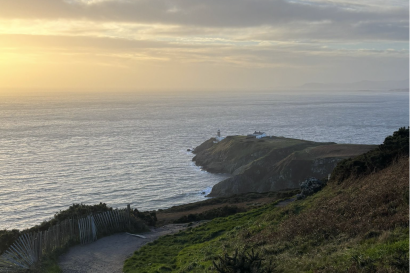During my first week in Dublin, while we were all still going through orientation, the IES Abroad staff put a poll up on a screen in front of us showing why most people said they were studying abroad. According to the poll, nearly half of all the IES Abroad Dublin students were studying abroad for the travel opportunities, and I was one of them. One of the main lures for studying abroad in another country, especially one in Europe, is all the other countries you can travel to and all the other cultures you can experience.
This is all prelude to my saying that I spent my spring break in Vienna and Prague. And, for all this thought about travel and exploration, I did not think until I was in the cab to Dublin Airport that I spoke neither German nor Czech.
“Hey,” I said, voice low, because it was four in the morning and we were all still pretty much asleep. “Do either of you speak German? Or know what language is spoken in Prague?”
We determined that none of us spoke the local languages, however we did know a few German words. Namely, we knew “danke” and “danke schoen,” which meant we could say “thank you” and “thank you very much.” Not exactly an entire basis to a language.
To further my frankness here, I could have taken a study abroad program based in a foreign language. I have been taking French classes since I was fourteen, and while I hardly qualify as fluent, I can get by when communicating with a native French-speaker. One of my travel companions is proficient in Spanish, and the other speaks Italian. For me at least, though, I specifically chose an English-speaking country to avoid the strange sense of isolation that comes from no one speaking your native tongue. I was, I think, afraid of not only butchering my second language, but scared of being alone, of going out and not being able to effectively communicate. In short, I was scared of not being able to relate to other human beings.
Day one in Vienna, I discovered that this was a needless fear.
Barring the fact that most people in tourist centers will speak a little English (though it is good manners to attempt the local language in your greetings and thanks, at the very least) communication through language barriers is more effective than you would believe if you hadn’t seen it.
On the metro one day, we saw a man standing next to a woman and shouting at her, though we couldn’t understand the words. Their argument got more heated, the woman got more upset, and it culminated in two other men on the metro politely but firmly telling the man to get off the train, the woman thanking them fervently, danke. We went to a demonstration of a woman baking apple strudel at Schönbrunn Palace, and she would frequently look our direction and make exaggerated movements as she repeated what she had just said in slower German. “Strudel cloth,” she said, slowly, holding up the edges of the cloth in question, then she flicked it up with a well-practiced hand, rolling the apple strudel into the dough in one fluid motion. In Prague, where the language was even less similar to English, sometimes we would be helpless to do more than point at the menu and make a questioning face (trdelnik, anyone?), and the usual response would be a good-natured laugh and a repetition of the word before nodding and writing down the order.
Mostly, we remembered to say “thank you” and “danke” and “děkuji,” and we laughed about how we kept reverting to other non-English languages, nearly tripping up with “merci” and “gracias” or even the Irish “sláinte,” which doesn’t mean “thank you” at all, but “cheers.” In every language, the point was the same. A nod and a smile and an embarrassed shrug for not knowing more, but an understanding. The communication was imperfect, but the people we met managed to always know what we were saying. Thank you for the food. Thank you for the opportunity. Thank you for the indulgence, and your understanding. Thank you from all over the world.

Elizabeth Coffman-Mackey
I am a fourth year college student living with my wife and our cat. I spend most of my free time writing stories or attempting to "vegetarianize" meat dishes. I love all kinds of fantasy, but especially the likes of Neil Gaiman and Terry Pratchett, and I hope to learn enough about English in college that I can spend the rest of my life getting paid to do the writing I will be doing anyway.









